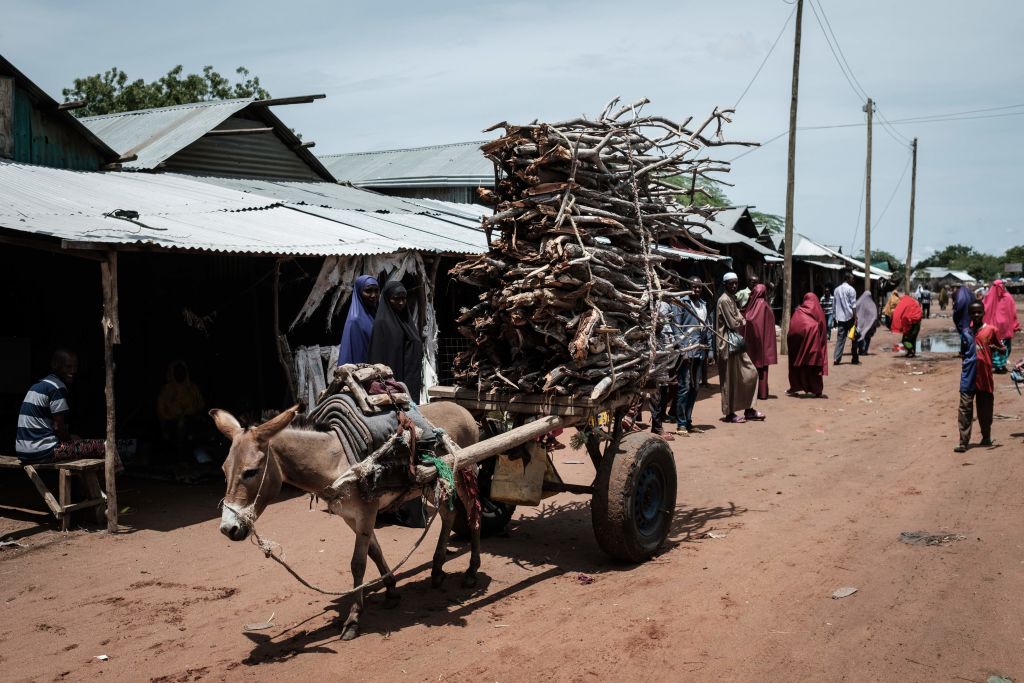Donkeys are essential pack animals in many rural African communities. They are the quiet laborers that carry clean water and firewood, transport children to school, mothers to clinics, and goods to market.
However, donkeys are disappearing and rising in cost due to Chinese demand for their hides. Wiebke Plasse of the German animal welfare group Welttierschutzgesellschaft recently visited a market in the southwestern Kenyan town of Bisil, about 60 kilometers from the Tanzanian border. Plasse saw several hundred donkeys at the market, and a trader said more were coming.
“When you ask, you find out: All these donkeys are reserved for a single buyer, who isn’t even here,” Plasse told The Revelator, an online environmental news and ideas platform run by the Center for Biological Diversity.
Many of the donkeys in Bisil were to be illegally slaughtered. Their hides were to be stripped, dried and packed in shipping containers bound for China’s Shandong Province. There, the hides would be boiled into a gelatin known as ejiao, which is used in traditional Chinese medicine.
Although there is no evidence of its effectiveness, ejiao historically has been used to prevent miscarriage, treat circulatory issues and reverse premature aging. Modern-day marketing fuels demand for ejiao. It has become a lifestyle product that is ground into powder, pills or liquid, or added to food, The Revelator reported.
China once had an estimated 11 million donkeys, the world’s largest population according to the Animal Welfare Institute. Demand for ejiao has driven China’s donkey population to as low as 3 million, prompting the ejiao industry to target Africa, home to about two-thirds of the world’s 53 million donkeys. Now, continental donkey populations have plummeted, and 41% of African donkey owners surveyed by The Donkey Sanctuary said they have had animals stolen.
On the outskirts of Nairobi, Kenya, a water seller named Steve relied on donkeys to pull him and his cart of jerrycans to his customers. One morning, Steve went to the field to get his animals.
“I couldn’t see them,” he told the BBC. “I searched all day, all night and the following day.”
Days later, a friend told Steve he had found the donkeys’ skeletons.
“They’d been killed, slaughtered, their skin was not there,” said Steve, who was saving money to study medicine. But without his donkeys, he cannot deliver water.
Soaring prices mean many families can’t afford to replace a stolen donkey. When incomes plummet due to donkey theft, girls often are forced to leave school and women suffer physically and emotionally as they struggle to perform heavy labor.
“When a family loses its livelihood … women are left to carry heavy burdens alone,” Anne Odari Onditi, a donkey owner and treasurer of the Association of Donkey Owners in Kenya, told The Donkey Sanctuary. “It is heartbreaking to see how quickly our donkeys are disappearing and how deeply this loss is felt.”
In response to thefts, Botswana, Burkina Faso, Ethiopia, The Gambia, Ghana, Kenya, Mali, Niger, Senegal, Tanzania and Uganda have banned or severely restricted the commercial slaughter of donkeys and the export of their hides.
In June, more than 200 African leaders met at the two-day Pan-African Donkey Summit in Côte d’Ivoire, where they committed to support the Pan-African Donkey Strategy developed by the African Union Inter-African Bureau for Animal Resources. The strategy calls for enforcement of the AU’s 2024 ban on the donkey skin trade, integration of donkey welfare into national policies, and investments in value chains, veterinary services and data systems.
“We have turned the moratorium into a springboard for action,” Moses Vilakati, the AU’s commissioner for Agriculture, Rural Development, Blue Economy and Sustainable Environment, said in a report by Kenya’s Capital FM news outlet. “Now, it is time for implementation — through law, community awareness, and surveillance.”

